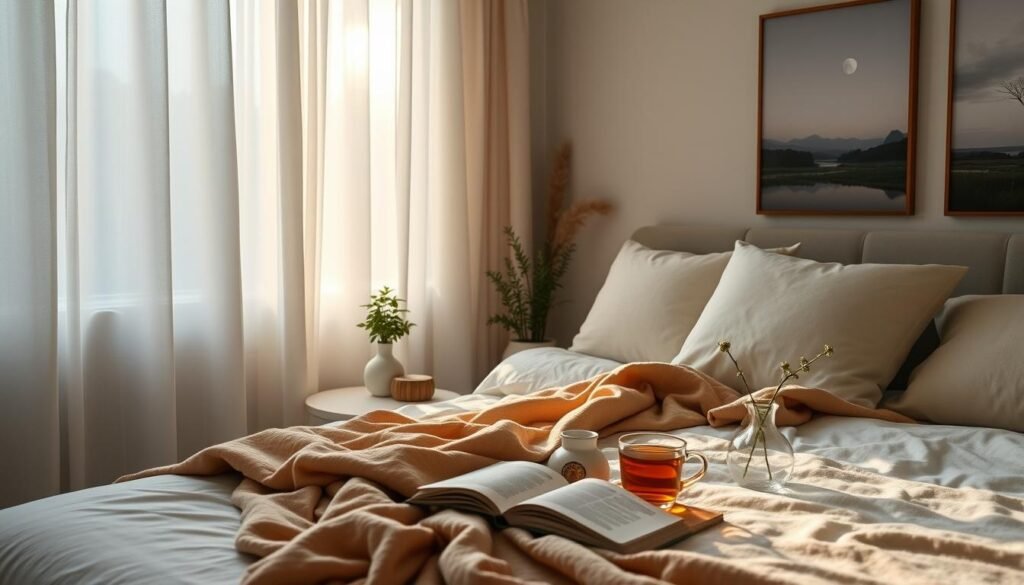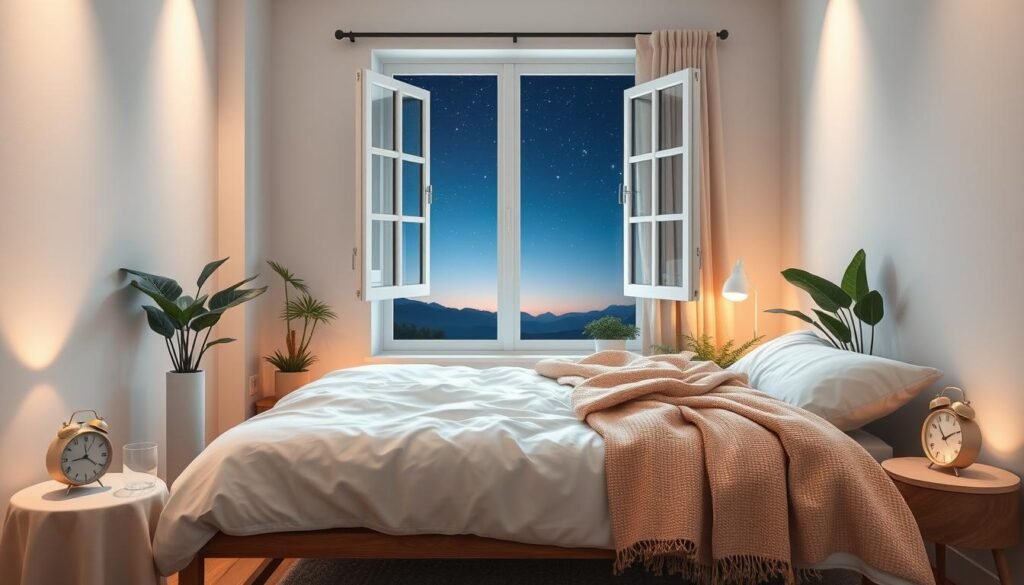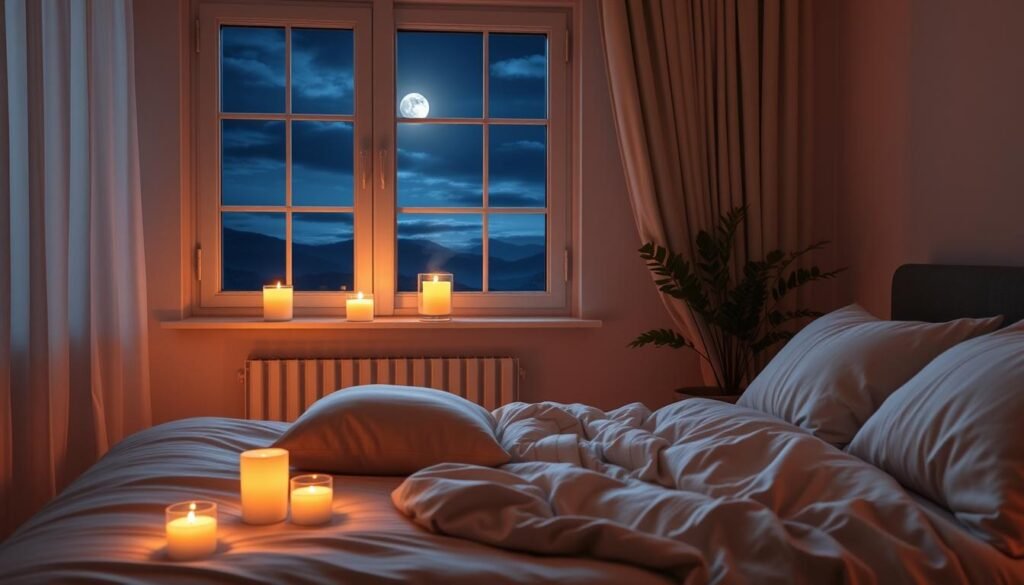More than a third of U.S. adults struggle with insomnia yearly. This problem affects over 60 million people in America. It can lead to serious health issues like depression and heart disease. While 2 to 6 percent of adults use prescription drugs for sleep, many now prefer natural methods. Things like warm milk or chamomile tea can enhance sleep without the downsides of medications. People are finding ways to get better sleep naturally, avoiding the negative effects of drugs.
Key Takeaways
- Over one third of adults experience insomnia annually.
- Natural solutions can effectively improve sleep quality.
- Chamomile tea and warm milk are popular home remedies.
- Exercising regularly can lead to better sleep outcomes.
- Cognitive Behavioral Therapy for Insomnia (CBT-I) is highly effective.
Understanding Insomnia and Its Impacts
Many people suffer from insomnia, which affects their daily life and well-being. Knowing the causes and consequences is vital for those facing sleep problems. About 10% of people have insomnia. It includes trouble falling or staying asleep, and feeling unrested after sleep. These sleep issues can harm health over time.
Common Causes of Insomnia
Many things can lead to insomnia. Stress, anxiety, and depression are top causes. Bad sleep habits and too much screen time also contribute. Health issues and some meds can make sleep worse, too. Noise and light can interfere with sleep. A family history of insomnia shows it can be genetic or learned.
Health Risks Associated with Poor Sleep
Poor sleep can cause serious health risks. It’s linked to heart disease, diabetes, and more. It can also make mental health issues like anxiety and depression worse. Not enough sleep affects memory and decision-making. It shows why fixing sleep problems is urgent.
First Line Treatment for Insomnia
When tackling insomnia, it’s essential to start right. Many professionals say you should first try natural ways, not drugs with side effects. These methods include living healthier and changing your behavior to sleep better.
Natural Approaches Versus Prescription Medications
Going natural means changing what you do daily and how you set up for sleep. Ways to help include a set bedtime, exercising, and a calm nighttime routine. These steps have been shown to help with insomnia.
While drugs like eszopiclone or zolpidem are available, it’s best not to depend on them for too long. Using them too much can cause problems, such as withdrawal for regular users. More and more, people prefer natural methods that don’t have these risks.
The Role of Cognitive Behavioral Therapy for Insomnia (CBT-I)
CBT-I is a big deal in treating insomnia. It focuses on the thoughts and behaviors that mess up sleep. Studies show CBT-I works as well as, or better than, medicines. It helps by tackling the root causes of insomnia, giving people the means to sleep well again.
Using CBT-I strategies helps in a lasting way to beat insomnia. It focuses on mental and behavioral shifts. By doing this, many improve their sleep without always relying on pills.

Sleep Hygiene Education for Better Sleep
Learning about good sleep habits is key to beating insomnia. It teaches simple steps we can take to sleep better. By sticking to a regular bedtime, making our bedrooms just right for sleeping, and avoiding things that make it hard to sleep, we can really improve our sleep.
Importance of a Sleep Schedule
Having a set bedtime and wake-up time is very important. It helps our body’s clock stay on track. This habit makes it easier to fall asleep and stay asleep all night.
Creating a Sleep-Inducing Environment
The perfect bedroom can help us sleep better. To do this, we need:
- A cool room to help us relax
- Darkness, maybe with blackout curtains
- A quiet space, maybe with a white noise machine or earplugs
- Comfortable beds that we like
- Fewer gadgets, especially when it’s time to sleep
With these changes, our bedrooms can become places that help us sleep well.
Avoiding Sleep Disruptors
Avoiding things that ruin our sleep is also important. Drinking caffeine or alcohol before bed can make it hard to sleep. Big meals can make us uncomfortable and keep us awake. Better habits, like not smoking and using screens less at night, help us sleep better.

By focusing on these key sleep hygiene ideas, we can sleep better and feel healthier. Working on our sleep routines, our bedrooms, and our evening habits can help us manage insomnia better.
Relaxation Techniques to Combat Insomnia
Making relaxation techniques part of your nightly routine can help with insomnia. These methods not just improve sleep but also manage stress and anxiety. With different techniques available, there’s something for everyone dealing with sleep problems.
Deep Breathing Exercises
Deep breathing is a simple method that calms the nervous system. It helps focus your mind away from stress. This makes you more relaxed and ready for sleep. The steps include:
- Find a quiet spot to sit or lie down.
- Inhale deeply through your nose, counting to four.
- Hold your breath for four seconds.
- Exhale slowly through your mouth for six seconds.
- Repeat for a few minutes.
Progressive Muscle Relaxation
Progressive muscle relaxation involves tensing then relaxing each muscle group. It helps lessen tension and brings calmness before bed. To practice:
- Lie in a cozy spot.
- Start with your toes, tense them for five seconds.
- Relax them, feeling the tension fade over ten seconds.
- Move up your body, repeating these steps for each muscle group.
Mindfulness Meditation for Sleep
Mindfulness meditation trains you to focus on now, helping with sleep issues. It shifts focus from worries to the current moment, aiding sleep. Here’s what to do:
- Find a quiet and comfy place.
- Sit or lie down, whatever feels best.
- With eyes closed, just breathe naturally. Pay attention to your breath’s rhythm.
- If your mind drifts, gently bring it back to your breathing.
Using these relaxation techniques regularly can boost your sleep quality. For more help with insomnia, check out further techniques in this resource.

| Technique | Benefits | How to Practice |
|---|---|---|
| Deep Breathing | Calms the nervous system | Inhale through the nose, exhale through the mouth |
| Progressive Muscle Relaxation | Reduces muscle tension | Tense each muscle group, then relax |
| Mindfulness Meditation | Improves focus on the present | Concentrate on breathing and redirect wandering thoughts |
Natural Supplements for Insomnia Relief
Many people want to sleep better without medicine. Supplements like melatonin, valerian root, and magnesium can help. Each has its own way of making sleep better.
Melatonin Supplements and Their Efficacy
Melatonin supplements help control sleep cycles. They are good for those with changing schedules or who use screens at night. A small dose can make sleep longer and better.
Valerian Root and Its Use in Sleep Treatments
Valerian root is an old sleep aid. It makes falling asleep easier by calming you down. Taking 400-900 milligrams before bed can improve sleep, studies show.
The Role of Magnesium in Improving Sleep Quality
Magnesium helps you sleep by relaxing your nerves. It’s especially good for those who don’t have enough magnesium. Getting enough magnesium can make your sleep better.
Adding these supplements to your daily life could help you sleep better. For more information on these sleep aids, visit reputable sources like health guides on sleep aids.
| Supplement | Typical Dosage | Potential Benefits |
|---|---|---|
| Melatonin | 1-3 mg before bedtime | Helps regulate sleep cycle |
| Valerian Root | 400-900 mg, 30-60 min before bed | May reduce the time to fall asleep |
| Magnesium | 200-400 mg daily | Supports nervous system relaxation |
Using Light and Chronotherapy for Better Sleep
Sleep troubles often tie back to our circadian rhythms. These rhythms are like our body’s clock. Tapping into understanding them can lead to better sleep. Using light therapy and chronotherapy can help bring these rhythms back in line.
Understanding Circadian Rhythms
Our natural circadian rhythms cycle every 24 hours. They control when we sleep and wake up, among other things. But factors like shift work, jet lag, or inconsistent sleeping patterns can throw them off. Conditions like Delayed Sleep Phase Disorder (DSPD) mess with our sleep schedules. DSPD is more common in teens and may be partly genetic.
How Light Therapy Can Help Insomnia
Light therapy is great for fixing sleep issues related to these rhythms. It involves bright light exposure at certain times, mainly in the morning. This helps regulate our sleep hormone, melatonin. Light therapy, alongside chronotherapy, helps set a normal sleep pattern. These methods offer hope for better sleep management.
Using these strategies daily can lead to significant sleep improvements. To learn more about what causes insomnia and how to deal with it, check out this resource.
Incorporating Exercise into Your Routine
Regular workouts are key to feeling better, especially for better sleep. The exercise benefits go beyond just getting fit. They also help you sleep well at night. Getting active can be a game-changer for those struggling with insomnia.
How Physical Activity Affects Sleep Quality
Just 30 minutes of moderate aerobic exercise can improve your sleep that same night. It leads to deeper, more healing sleep. But, remember not to work out too close to bedtime. This could make you too energized to sleep.
Find out what time works best for you. Some might like morning workouts, while others prefer evenings.
Best Types of Exercises for Improving Sleep
Here are some exercises known to help with sleep:
- Moderate aerobic activities like walking, swimming, or biking
- Yoga and stretching, great for calming down and lessening stress
- Resistance training to boost fitness and sleep better
Regular exercise is great for health and fighting insomnia. It helps you sleep more soundly. Check out these detailed resources for more on sleep and exercise.
| Type of Exercise | Impact on Sleep Quality |
|---|---|
| Moderate Aerobic Exercise | Increases slow wave sleep; promotes deeper rest |
| Yoga | Enhances relaxation; reduces anxiety levels |
| Resistance Training | Improves physical fitness; positively influences sleep |
Importance of Sleep Restriction Therapy and Stimulus Control Therapy
Sleep Restriction Therapy and Stimulus Control Therapy are key parts of Cognitive Behavioral Therapy for Insomnia (CBT-I). They play a big role in making sleep better. These therapies tailor approaches to fight the root causes of insomnia.
Understanding Sleep Restriction Therapy
Sleep Restriction Therapy (SRT) is about improving sleep by limiting bed time. It helps match bed time to when you’re truly sleepy. This leads to a steadier sleep-wake routine.
Over time, as sleep gets better, you can stay in bed longer. This method helps people sleep deeper, making them less tired in the daytime.
Benefits of Stimulus Control Therapy
Stimulus Control Therapy (SCT) works well for different sleep problems. It strengthens the bed-sleep link. This reduces bedroom activities that can interrupt sleep.
It suggests using the bed just for sleep and intimacy. No TV watching or working in bed. This makes for a healthier sleep setting. It helps fight the cues that keep you awake.
By following SCT, improvements in falling asleep faster, staying asleep longer, and better sleep quality are seen. Improving sleep habits has great results.
| Aspect | Sleep Restriction Therapy (SRT) | Stimulus Control Therapy (SCT) |
|---|---|---|
| Primary Goal | Enhance sleep efficiency by limiting time in bed | Strengthen the association between sleep and bedroom |
| Method | Match time in bed to actual sleep duration | Reduce activities unrelated to sleep in the bedroom |
| Schedule | Encourages consistent sleep-wake patterns | Promotes going to bed only when sleepy |
| Outcome | Improvement in sleep consolidation | Reduction in insomnia symptoms |
Conclusion
Managing insomnia well often means looking at your own sleep patterns first. It also means trying natural ways to sleep better before thinking about medicine. This is important for those with chronic insomnia, which touches one in three adults in the U.S.
To improve your well-being, stick to a regular sleep time. Make your sleeping space welcoming for rest. For calmness, try doing things like mindfulness meditation.
Psychological methods like cognitive behavioral therapy (CBT) have helped people sleep better. These benefits have lasted for months after the treatment ended. While medicines can help for a short while, they’re not the first thing to reach for.
Taking natural supplements like melatonin and valerian root can also improve your sleep. This way, you depend less on medicines.
By using these tips and making small changes in your life, you can beat insomnia. Such an all-around approach helps you sleep better. It leads to healthier sleep habits and a happier life overall.